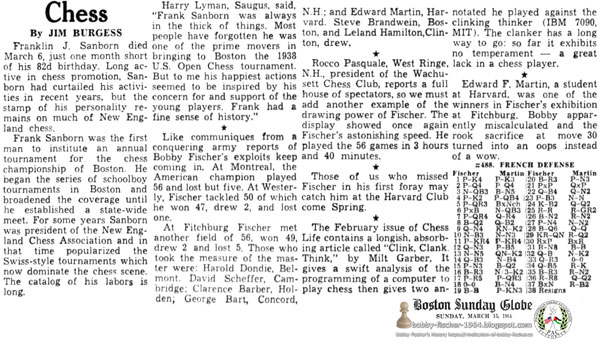The Boston Globe Boston, Massachusetts Sunday, March 15, 1964 - Page 113
Chess By Jim Burgess
Franklin J. Sanborn died March 6, just one month short of his 82d birthday. Long active in chess promotion, Sanborn had curtailed his activities in recent years, but the stamp of his personality remains on much of New England chess.
Frank Sanborn was the first man to institute an annual tournament for the chess championship of Boston. He began the series of schoolboy tournaments in Boston and broadened the coverage until he established a state-wide meet. For some years Sanborn was president of the New England Chess Association and in that time popularized the Swiss-style tournaments which now dominate the chess scene. The catalog of his labors is long.
Harry Lyman, Saugus, said, “Frank Sanborn was always in the thick of things. Most people have forgotten he was one of the prime movers in bringing to Boston the 1938 U.S. Open Chess tournament. But to me his happiest actions seemed to be inspired by his concern for and support of the young players. Frank had a fine sense of history.”
Like communiques from a conquering army reports of Bobby Fischer's exploits keep coming in. At Montreal, the American champion played 56 and lost but five. At Westerly, Fischer tackled 50 of which he won 47, drew 2, and lost one.
At Fitchburg Fischer met another field of 56, won 49, drew 2 and lost 5. Those who took the measure of the master were: Harold Dondie, Belmont. David Scheffer, Cambridge; Clarence Barber, Holden; George Bart, Concord, N.H.; and Edward Martin, Harvard. Steve Brandwein, Boston, and Leland Hamilton, Clinton, drew.
Rocco Pasquale, West Ringe, N.H., president of the Wachusett Chess Club, reports a full house of spectators, so we must add another example of the drawing power of Fischer. The display showed once again Fischer's astonishing speed. He played the 56 games in 3 hours and 40 minutes.
Those of us who missed Fischer in his first foray may catch him at the Harvard Club come Spring.
The February issue of Chess Life contains a longish, absorbing article called “Clink, Clank, Think,” by Milt Garber. It gives a swift analysis of the programming of a computer to play chess then gives two annotated he played against the clinking thinker (IBM 7090, MIT). The clanker has a long way to go: so far it exhibits no temperament — a great lack in a chess player.
Edward F. Martin, a student at Harvard was one of the winners in Fischer's exhibition at Fitchburg. Bobby apparently miscalculated and the rook sacrifice at move 30 turned into an oops instead of a wow.























